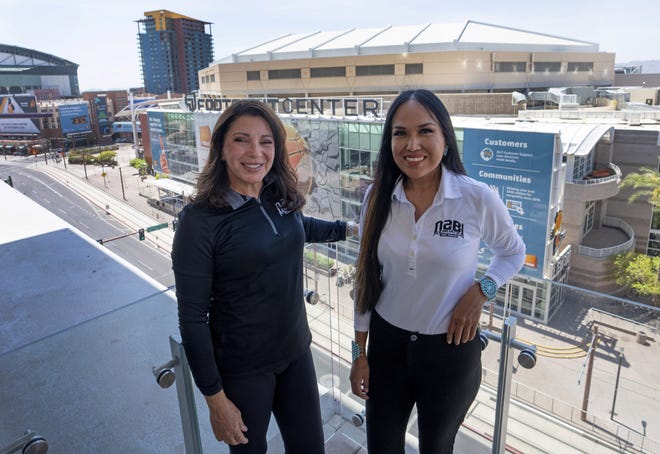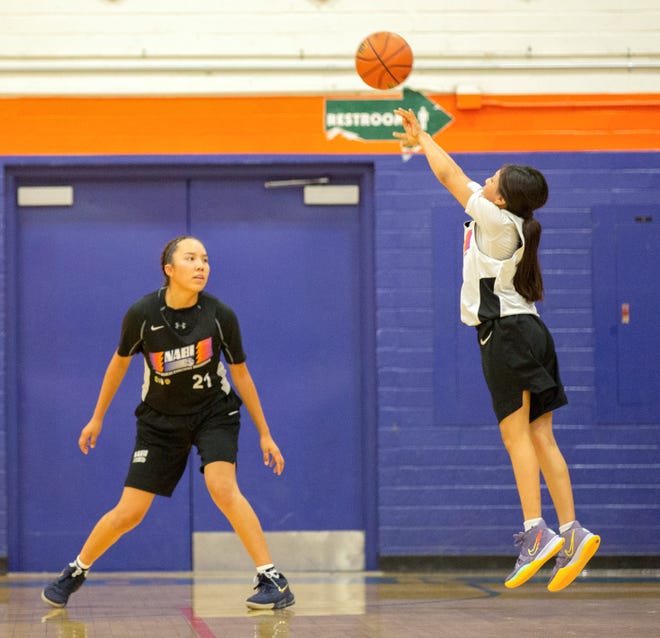The Native American Basketball Invitational is working to make education more accessible for Native American youth.
NABI, entering its 19th year as the largest Native basketball tournament in the country, added its educational youth summit in 2019.
NABI President and CEO GinaMarie Scarpa wanted to add the summit to give Native American youth more opportunities to pursue higher education, she said. According to the Postsecondary National Policy Institute, just 24% of Native American youth between the ages of 18-24 are enrolled in college programs, compared to 41% of the US population.
But Scarpa and NABI director of basketball operations Lynette Lewis realized they couldn’t run the educational summit alone in its third year, especially with recent broadcasting duties. So, NABI teamed up with Partnership With Native Americans, a non-profit invested in education, to run the summit in 2022. PWNA primarily works with underrepresented reservation communities around the nation to help with education, disaster relief and community involvement.
“We just knew at the end of the day, with the road that we were going on with streaming and production and wanting to take NABI to the next level, let the non-profits do the educational programs the best, do it,” Scarpa said. “We’re basketball, we’re tournament, but we were still doing it, and it was successful. (Working with PWNA) is one of those ideas that we’re like, ‘Why didn’t we start doing this in the beginning?’”
PWNA has a lineup of speakers for this week’s three-day educational summit in the Valley, open only to NABI youth participants. NABI teams were also required to attend a college and career fair at Phoenix College on Sunday ahead of the tournament.
“These high school students will hear from former NABI alumni, former PWNA scholarship recipients, at least one per athlete, college recruitment professionals, our CEO about leadership development, and more,” PWNA Vice President of Programs Rafael Tapia said in an email to the Republic. “There will even be digital training sessions through our career readiness initiative with Google.”
Scarpa said NABI is also planning to bring in other Native American-focused non-profits, like the Phoenix Indian Center, in the future so PWNA doesn’t have to shoulder the summit by itself.
The tournament begins on Monday with pool games around the Phoenix area, leading to boys and girls bracket play starting Tuesday and concluding Friday. The championships are at Footprint Center on Saturday afternoon.
Lewis grew up near the Navajo reservation in Farmington, New Mexico, and knew the importance of education as her family moved off the reservation for her to attend public school.
She attended Arizona State, obtaining a degree in chemistry before she realized her passion for NABI. Later, she returned to ASU to get a master’s certificate in nonprofit management. Scarpa, who also got a nonprofit management certificate, pushed Lewis to get the degree.
“I wanted to get out of where I was at after high school, and I did, because of school,” Lewis said. “I wanted to go to college, and I worked really hard to do that… it was really important for me to keep my grades, because I knew scholarships were the only way to do that.”
According to PNPI, 20% of Native Americans had bachelor’s degrees as of November 2021. Native American enrollment in undergraduate programs decreased between 2016-17 and 2019-20, according to PNPI, but the percentage of those who have associates’ degrees increased from 21 to 25% between 2010-19.
Every year, NABI awards academic scholarships to graduating seniors. NABI will award two $10,000 scholarships to 2022 graduates who participate in the tournament this year.
“Education is a cornerstone of economic mobility — it can only be achieved through racial and social equity,” Tapia wrote. “Fortunately, the Native college graduation rate is increasing, paving the way for more Indigenous scholars. With more funding, these numbers would continue to rise.”



Comments are closed.